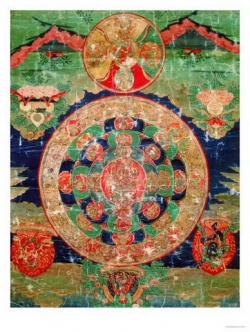Death & Dying Causes of Death
There are three principal causes of death: the ending of the karmically determined life span, exhaustion of merit, and loss of power of the life force. As a result of having kept moral discipline in a previous life and having engaged in other virtuous actions such as saving others’ lives, we have now obtained a human rebirth with the average life span of, say, seventy years. Although we have created the cause for a life of this length it is possible to die earlier or to live longer. Severe negative actions done in this life can shorten our life span, while virtuous actions such as refraining from killing, and caring for the sick, can lengthen it.
Some people die due to lack of merit even though their life span has not ended. They are unable to find the necessities to sustain life, such as food or the right medicine. The few remaining years of their life are then `carried over’ into a future human rebirth, which will probably be short and characterized by misfortune. Other people rich in merit can find excellent conditions and thereby manage to live a few years longer than their karmically determined life span.
The third cause of death is loss of power of the life force. The life force is the power of our life-supporting wind. This inner wind, which abides at our heart, functions to maintain the connection between our mind and body. When its strength diminishes, the connection is broken and we die. Illness, spirits, accidents, or a negative and unhealthy life style can all weaken our life force. If our life span, merit, and life force are all exhausted we shall definitely die, but if one or two of these causes of life remain it is possible to renew the others. For example, if our life span and life force are still intact but our merit has run out, we can create more merit by performing virtuous actions. If our life force is damaged, then, provided we have merit or life span, we can restore it by engaging in practices such as vase breathing at our heart. This is one of the best methods to increase the power of our life-supporting wind. To do this we gather the inner winds from the upper and lower parts of our body at our heart, imagining that they dissolve into our life-supporting wind. Then we hold our winds and mind at the heart, remaining concentrated there for as long as we can.
Our life force is our most precious possession and so we need to stabilize and increase it. Once it is destroyed the damage cannot be repaired. If we lose any other possession our loss can be restored, but once our life span finishes we cannot borrow any more time to complete the tasks of this life. Therefore, if we are wasting our vitality in meaningless pursuits we should feel this as the greatest loss. If our life is short or we squander it we cannot complete our spiritual practice.
